
- Homepage
- Binding
- 1 / 2 Leather (2)
- 3 / 4 Leather (2)
- Brochure / Pamphlet (4)
- Cloth (87)
- Disbound (3)
- Fine Binding (52)
- Hard Back (2)
- Hard Cover (4)
- Hardback (6)
- Hardcover (893)
- Hardcover Sheepskin (2)
- Hardcover W / Jacket (5)
- Hardcovers (2)
- Leather (259)
- Original Blue Cloth (2)
- Quarter Leather (3)
- Softcover (3)
- Softcover, Wraps (42)
- ... (3553)
- Language
- Region
- Subject
- American History (7)
- Americana (79)
- Art & Photography (7)
- Bible (12)
- Children's (4)
- Civil War (60)
- Exploration & Travel (5)
- Fashion & Costumes (4)
- Figures & Portraits (19)
- Historic & Vintage (10)
- History (255)
- Illustrated (7)
- Literature & Fiction (37)
- Men, Civil War (8)
- Military (20)
- Military & Political (131)
- Military & War (644)
- New York (4)
- Reference (19)
- Science & Medicine (8)
- ... (3586)
- Topic
- American (us) (22)
- American Civil War (14)
- American History (4)
- Atlases (4)
- Bible (5)
- Christianity, Bibles (97)
- Christmas (4)
- Civil War (50)
- Civil War (1861-65) (894)
- Classics (6)
- Essays & Speeches (3)
- Grant (3)
- Historical (34)
- Literature (5)
- Military (24)
- Plantation Life (6)
- Religion (6)
- The Civil War (4)
- U.s. Grant (13)
- United States (30)
- ... (3698)
- Year Printed
Action-Packed Civil War Letter Archive by Pvt Daniel H Hopping, 24th NY Cavalry
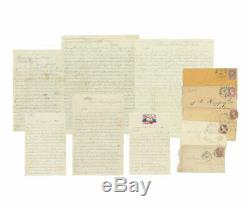
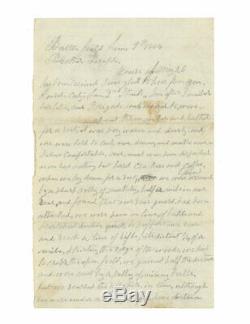
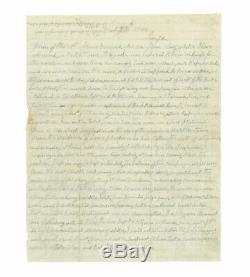
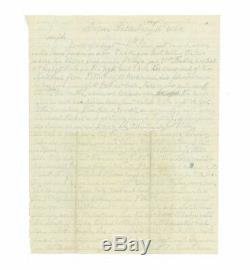
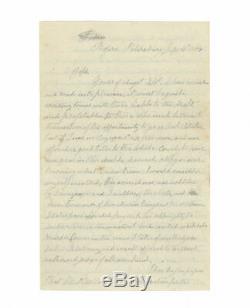
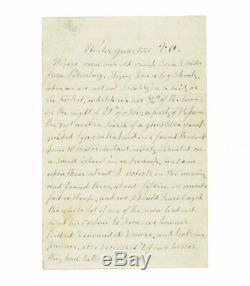
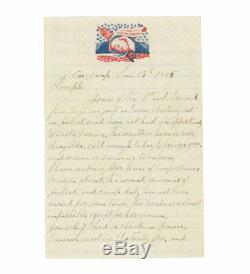
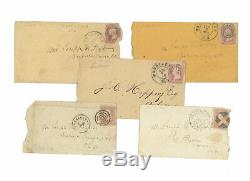


A fascinating and action-packed collection of six letters written by Private Daniel H. Hopping of the 24th New York Cavalry , including details of the battles of Cold Harbor , the Crater (Petersburg), Weldon Railroad (Petersburg), and two cavalry raids toward Stony Creek Station. Partial transcripts appear at the bottom of this listing.
Hopping was a 44-year-old carriage maker in 1861 when he enlisted in Battery A, 3rd New York Artillery. He was discharged for disability in March 1862, but in August 1863 enlisted in the 15th New York Cavalry.Again he was discharged, this time for being under size (Hopping is listed as having been 5 6). In December 1863 he enlisted in the 24th New York Cavalry, a regiment made up largely of men from the old 24th New York Infantry, whose term had expired earlier in the year. The first letter in the archive was written from the Cold Harbor battlefield on June 9, where Union and Confederate armies waited behind heavy fortifications a week after the bloody assault of June 3.
He described the regiment settling down for a rest on June 2 when they were soon aroused by a sharp rolling of musketry half a mile in our rear and found that our rear guard has been attacked. The regiment had not yet received its horses and so was fighting as infantry in the federal 9th Corps. We were but nicely in position when the Rebs charged on us, he wrote.
On they came yelling like demons, but we were ready for them. He also described having witnessed some of the fighting on June 3, in which the Rebs fought like very devils, but they were met every time and repulsed. The second letter was written July 29 from the Petersburg front. Hoppings company had been out on picket when he witnessed a large-scale shelling of Petersburg. Last night about sundown cannonading commenced in the direction of Petersburg.
It soon became very severe for a mile or more along the line. Heavy mortars, sixty four pounder siege guns, and of various caliber were used in such rapid succession, causing such a continual reverberation that one could hardly distinguish one gun from another. The sky was illumined over Petersburg with all the appearance that the city was in flames on account of the distance and continual discharge of artillery. I could not tell whether they were engaged with small arms or not.
You need not be surprised to hear that a severe engagement has taken place and that Petersburg is in ashes. Hopping continued his letter describing the July 30 mine explosion under the Rebel fort known as Elliott's Salient. We had orders to rest until three o'clock and then be ready to move with noting but our arms, haversacks, and canteens. It began to look ominous of a battle. We started at three directly for the front and in the direction of Petersburg.
We halted near our front line and found a large force of the 9th Corps massed for an attack on the enemy. We waited until the sun was almost rising, when we were startled suddenly by a convulsive movement of the earth, and a dull heavy explosion. Almost simultaneously one hundred pieces of artillery belched forth pouring tons of shot and shell into the enemy's front line of earthworks. A rebel fort had blown to atoms standing in front and close to their front line of works. He further described the resulting assault by the 9th Corps, which carried two lines of works before meeting with disaster when assaulting the crater where the fort had been.
The enemy charged on them and soon had taken back all we had gained, Hopping wrote. With the exception of the explosion of the fort they stood where they did before the battle commenced. The fort presented a horrible sight when our troops reached it.
Men mangled in all ways imaginable. He closed the letter with I consider this campaign a total failure. The third letter was written from the Petersburg trenches on August 16. Hopping and his comrades were still holding the lines across from where the assault had been made on the Crater. The usual picket and artillery firing is kept up, he wrote.
A few men are killed or wounded every day. This campaign tries both soul and body. After an awful six weeks of campaigning from the Rapidan RIver to Petersburg, and then more weeks of digging trenches and dodging sharpshooters, Hopping had had enough of the war. Do the abolitionists still say use up the last man and the last dollar to subjugate the south? If they do they had better shoulder the musket and turn out en masse, and come down here.
I think they would find it quite a different affair. I believe the best military men in the Federal army are convinced that it is time to have peace otherwise than by fighting. I think it a poor argument today that after we have sacrificed millions of human lives and almost impoverished the country that we must fight it out if the country is ruined beyond redemption. The sacrifices and sufferings of the Army of the Potomac in this summer campaign has been sufficient to establish peace to the country if the conduct of the war had been just and right and I hope the all wise being who rules the universe will put it in the hearts of the people of this nation to all that peace is better than war, and that might is not right.
The fourth letter in the archive was written on September 4, still from the Petersburg trenches. Hopping described a bombardment of Confederate artillery in which two men were killed that morning within a few feet of me, and many were wounded all around me, one shell bursting within ten feet of me [and] wounded five, two of them mortally. He also recounted being on picket during some of the August operations against the Weldon Railroad. We had just been relieved by another Regt not to exceed twenty minutes, he described, when they were flanked by a large force of the enemy and all captured with eight of our men who had stopped to talk with some of the relief. Returning to Union lines, the 24th New York Cavalry was put to work building more fortifications.
Hoppings fifth letter was written in early December, after the regiment had finally been issued horses. It opens with a description of the the surprise and capture of several guerrillas. We came upon them about 2 oclock in the morning and found them about fifteen in number fast asleep, he wrote, and we should have bagged the whole lot if one of the men had not fired his carbine too soon. We however killed 3 [and] wounded 3 more, and took one prisoner.
Also recovered 7 of our horses they had taken from us. Describing a December 1 action, he wrote our Division went out to Stony Creek Station on the Weldon R.
Some twenty miles from camp. We also burnt a large steam grist and saw mill. This was followed by the more well-known December 7 Stony Creek Raid in which Hopping and his comrades very effectively destroyed over 21 miles of R.
He described how an entire brigade would take hold of the rail and ties and turn the whole thing over. Another party followed in their rear, building fires from pine fence rails, which were plenty, burning the ties and warping the rails so that they are entirely useless.
The letter closes with a description of how the men, angered at the murder of five comrades by bushwackers, burned a town that Hopping called Comans, but which was most likely Sussex Court House. Hopping wrote that some of the finest buildings I have seen in Va was on our road to camp, and in less than 10 hours there was nothing left of them but smoking embers and stacks of chimneys. The sixth and final letter in the archive was written on January 16, 1865. Hopping described being on picket duty and eating an unfortunate Christmas dinner of hard tack and raw pork.
The letters are all in very good to excellent condition, with the largest measuring about 7 1/2 x 9 1/2 and the smallest being about 4 x 6. One of the smaller letters has a lovely decoration with the caption The Constitution.
Minor foxing and toning on some pieces. All are creased where originally folded. Five of the letters include their original covers as shown. Excerpts from each of the letters follow. 1 written to Hoppings brother Joseph - June 9, 1864 - From the trenches at Cold Harbor - Descriptions of the fighting of June 2 and 3 at Cold Harbor. When we lay down for a rest we were soon aroused by a sharp rolling of musketry half a mile in our rear and found that our rear guard has been attacked.We were soon in line of battle and started at double quick to support our rear and reach a line of rifle pits distant 1/4 of a mile. Skirting the edge of the woods we had to cross the open field. We gained half the distance and were met by a volley of minny balls. But we reached the rifle pits in time, although we were under a heavy fire for some distance. We suffered some loss before we had gained our position, but not as much as I should have supposed under the circumstances.
We were but nicely in position when the Rebs charged on us. It was the last charge many of them will ever make. Our artillery soon commenced shelling from our rear, and the enemy opened on us with shell, grape, and canister, but our position was such that the enemies fire was not very effective. The battle lasted from four until eight p.
What the loss on the side of the enemy was will not be known soon, but I was told by those who looked up our dead and wounded that they lay very thick near our rifle pits. The loss in the 24 Cav was 106 killed, wounded, and missing. What our whole loss was I have not been able to learn. Our Brigade fell back a mile and took up another position working til night entrenching. Next morning at 4 o'clock, the enemy were attacked, they having advanced a division, taking position about one fourth of a mile from our front. The 24th being in the front line, and occupying a position to support the artillery, gave us a fair view of the engagement or part of it. The attack was made by a brigade of Pennsylvania troops who advanced on the enemy across our breastworks, and charged the first line of the Rebs. A heavy line of skirmishers appeared in the edge of the woods, some forty rods in front of our line, the instant our troops had crossed it, but were quickly driven back as our brave fellows advanced unflinchingly. But some of them never reached the woods.Some fell before they had advanced twenty paces from our breastwork. The wounded were assisted the rear as quickly as possible. I noticed one poor fellow who was shot through the cheek, his tongue hanging from his mouth having been severed by the ball.
There are many incidents of that terrible battle which I cannot mention now. The Rebs fought like very devils, but they were met every time and repulsed. The battle ceased at dusk and the Rebs fell back as usual, leaving us in possession of their earthworks. We are now nine miles from Richmond.
There has been no fighting for several days, except skirmishing. 2 to brother Joseph - July 29, 1864 - Petersburg trenches - July 30 mine explosion - Battle of the Crater. On the 28th our Brigade was ordered to be in readiness for the march in one hour's time.Accordingly, tents were struck, our tarps packed, and we were soon on the move. We moved back to the rear out of sight of the Rebs. We are stationed on the extreme left and to the rear, forming a skirmish line to prevent a flank movement of the enemy, or a surprise.
I have five men on a post stationed some 15 rods apart. My post is in the edge of the road a short distance from the residence of some planter who has taken the oath of allegiance and remaining at home with his family, protected by a file of our men. Laughing in his sleeve in the meantime probably at how he is coming in over the Yankees.
You nee not be surprised to hear that a severe engagement has taken place and that Petersburg is in ashes. I had to close suddenly day before yesterday. We marched back to the right and halted near our camp which we left two days before.
Before the enemy had time to recover (from the effects of the explosion) a division of the 9th Corps had charged on their front line and carried it. The enemy had now become fully sensible of what was transpiring and opened on our men with grape and canister and musketry from their second line, but wholly regardless of danger they soon reached the 2nd line and carried it, but it was done at a fearful cost of life. A terrible artillery duel was going on dealing death on every hand.Our division held what they had gained until ten o'clock, when a division of colored troops were ordered in to relieve them and charge on the 3rd line. They went in and advanced near to the 3rd line when the Black rascals broke and run like sheep. The enemy charged on them and soon had taken back all we had gained. I have it from good authority that our loss is five thousand. 3 of white and 2 of colored troops in killed, wounded, and prisoners.
I suppose we have lost more in prisoners than the enemy have. Burnside asked for a truce to bury the dead and remove the wounded.
For some reason it was not granted until this morning at 8 o'clock. It was a hard sight to see them lying on the field within a few rods from our works and could render no assistance. Many died, no doubt, which might have been saved could they have received help, but such is the fortunes of war. I have not space to give you a description of this battle as I would like to. I would like to see what the press says about it.
Please send me a paper. I consider this campaign a total failure. 3 to brother Joseph - August 16, 1864 - From the Petersburg Trenches - Picket Firing - Anti-Abolitionist & Pro-Peace Sentiments. We are in the same position as when I wrote you last, holding the line where the charge was made from on July 30th. Butler has had a fight down on the right and I hear has command of the Railroad from Petersburg to Richmond.
How far otherwise he has been successful I did not learn. There is now only one line of battle in the center, where our Brigade are.
The troops lying in our rear having been sent either to the right or left. There has been nothing transpired recently in our vicinity of much note. The usual picket and artillery firing is kept up. You mention a fight the 9th Corps had with the enemy on the 7th inst.
Part of the Corps might have been in the fight, but not to my knowledge. I believe the best military men in the Federal army are convinced that it is time to have peace otherwise than by fighting, and that it can be done honorably to both parties. 4 to brother Joseph - September 4, 1864 - From the Petersburg Trenches - Pro-Peace Sentiments - McClellan for President - Enduring an Artillery Bombardment - August Operations Against the Weldon Railroad. It must be quite exciting times with those liable to the draft and profitable to those who wish to avail themselves of the opportunity to go as substitutes. But if I was in Cayuga Co.A free man, and was offered a good title to the whole county to serve one year in this double damned Nigger war, knowing what I now know, I would consider myself insulted. This accursed war was instituted by demagogues and gamblers of the North, and from thousands of sanctuaries throughout the Northern states [that have] ascended prayers to the Almighty to sustain them in this unnatural and wicked wholesale murder (never in the view I take of matters) was such blasphemy and insult offered to the real author and judge of mankind. I see by the papers that McClellan has the nomination for the Presidency on the Democratic ticket. For the past ten days our Brigade have been almost continually on duty or on the march, day and night. It is almost a miracle that many of the 24th are left to tell their friends that they are still in the Army of the Potomac.
About ten days ago we occupied some works in the advance, not more than twenty rods from the enemy. Orders came to march at three in the morning. About twelve at night, the enemy opened two Batteries on us from right and left, with shells filled with iron bullets from the size of a musket ball to that of an inch diameter. The batteries were so near that the shell would burst before the report of the gun could be heard, giving us no warning until we saw the blaze of the infernal shell and heard the whizzing of its fragments and its contents often before the report died. Away could be heard the painful cry of some of our comrades who had fallen to rise no more. Two men were killed that morning within a few feet of me, and many were wounded all around me, one shell bursting within ten feet of me [and] wounded five, two of them mortally. Perhaps some protecting hand warded off the deadly missiles. At the taking of the Weldon [Rail] Road our Regt were on Picket. We had just been relieved by another Regt not to exceed twenty minutes when they were flanked by a large force of the enemy and all captured with eight of our men who had stopped to talk with some of the relief.I dont know but we were unfortunate in being relieved so soon. We are now some three miles from Petersburg building breastworks and forts in advance of the old line of works, and straightening the line as our regt are on fatigue twenty four hours and on picket the next twenty four. It has been quiet along the line for some days.
The enemy in our front are about a mile off. 5 - Undated, but likely from December 1864 - Winter Quarters - Surprising a Band of Rebel Guerrillas - Destroying Track on the Weldon Railroad - The Burning of Sussex Court House. On the night of the 29th of Nov. A party of 75 from the regt went in search of a guerrilla camp.
Guided by a contraband, we found the camp some 10 miles distant, nicely situated on a small island in a swamp. We came upon them about 2 oclock in the morning and found them about fifteen in number fast asleep, and we should have bagged the whole lot if one of the men had not fired his carbine too soon. Dec 1st our Division went out to Stony Creek Station on the Weldon R.
We had some sharp skirmishing for a short time. The loss on either side was slight. Dec 7th the Division started on a raid accompanied by part of the 2nd and 5 Corps.We reached the Weldon [Rail] Road near Stony Creek Station the first day, and destroyed some 3 miles of the track. Before dark the next morning the infantry joined us and we operated together, destroying the road as far as Belfield some forty miles from Petersburg, where we found the enemy in strong force and entrenched. The object of the raid seemed to have been accomplished thus far. We had very effectively destroyed over 21 miles of R.
A whole Brigade would take hold of the rail and ties and turn the whole thing over. A severe storm of rain mired with snow now set in and rations for men and horses, being nearly expended, I think, prevented an attack being made on the enemys works. We countermarched by the same road we marched out by.
The enemy followed us some 25 miles and we had skirmishing in the rear and flank, considerable of the time. Passing through the small village of Comans we learned that 5 infantrymen which had straggled to the rear had been killed by Bushwackers.
Warren now issued an order to burn everything of value on the road, and the order was obeyed to the letter. Some of the finest buildings I have seen in Va was on our road to camp, and in less than 10 hours there was nothing left of them but smoking embers and stacks of chimneys. There was much connected with the raid that the papers can better inform you of than I can.There must have been a large amount of property destroyed. 6 to brother Joseph - January 16, 1865 - Picket Duty - Requests New Boots. The usual amount of picket and camp duty has not been varied for some time. The roads are almost impassable except for horsemen. Joseph I had a Christmas dinner.
I answer most emphatically Yes, and ate it with a keen relish, sitting on my horse in an orchard on picket. My dinner consisted of hard tack and raw pork, but the ghosts of former Christmas dinners and the remembrance of kind friends I enjoyed them with brought to my memory anything but pleasant reflections. I wish you would get some good boot maker to make a pair of boots from calf that will fit you with an insole inside and extra taps.Have the by the 1st of Feb. Your boots are plenty large for me. I want them in good taste and durable.
I may come for them myself, or I may send for them. As my duty is performed almost entirely in the saddle, I don't want a very heavy boot. Furloughs are given to some particular ones, and I may get one if I can bring the proper influence. Please see my other items for more interesting and original Civil War pieces. The item "Action-Packed Civil War Letter Archive by Pvt Daniel H Hopping, 24th NY Cavalry" is in sale since Tuesday, April 16, 2019. This item is in the category "Collectibles\Militaria\Civil War (1861-65)\Original Period Items\Correspondence, Mail". The seller is "iron-horse-sales" and is located in Champaign, Illinois. This item can be shipped to United States, Canada, United Kingdom, Denmark, Romania, Slovakia, Bulgaria, Czech republic, Finland, Hungary, Latvia, Lithuania, Malta, Estonia, Australia, Greece, Portugal, Cyprus, Slovenia, Japan, China, Sweden, South Korea, Indonesia, Thailand, Belgium, France, Hong Kong, Ireland, Netherlands, Poland, Spain, Italy, Germany, Austria, Bahamas, Israel, Mexico, New Zealand, Singapore, Switzerland, Norway, Saudi arabia, Ukraine, United arab emirates, Qatar, Kuwait, Bahrain, Croatia, Malaysia, Colombia, Panama, Jamaica, Bangladesh, Uruguay, South africa.
